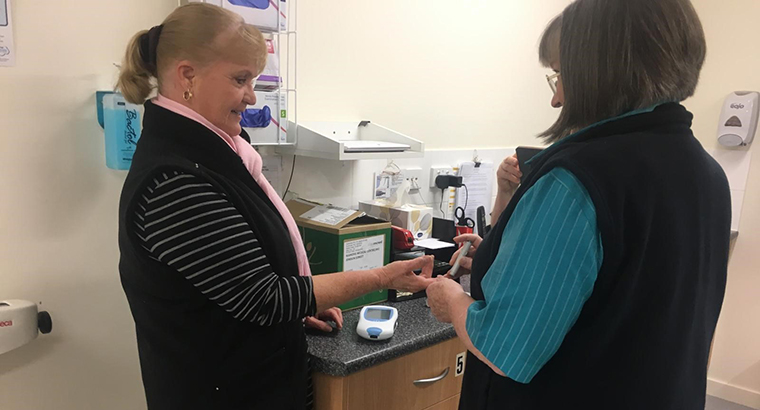News
Point-of-care testing vital for rural practices, says GP
Point-of-care testing improves care for patients in rural areas, according to a rural GP. Now the RACGP will pilot the Standards for point of care testing in general practices.
 Dr Ken Wanguhu, of SA’s Waikerie Medical Centre, says the availability of point-of-care testing is often lifesaving in rural areas.
Dr Ken Wanguhu, of SA’s Waikerie Medical Centre, says the availability of point-of-care testing is often lifesaving in rural areas.
To manage her pulmonary embolism medication dose for the first 12 months, Michelle Ward needed to get her blood tested at least once a week.
It was the year 2000 and the mother-of-one from Waikerie, a rural town in South Australia, was also undergoing chemotherapy to battle breast cancer.
‘I got to a point where I really didn’t want to do it. Because I had so much chemotherapy in my veins, my veins were not good,’ Ms Ward told newsGP.
‘So sometimes they might try three or four times to try and get some blood out of me.’
Ms Ward also had to wait for results before any changes could be made to her medicine, Warfarin, which she was taking to stop her blood from clotting.
‘If you had the blood test that day, you’d know [your results] that night,’ she said.
‘Then you’d get a phone call from the doctor to tell you what strength Warfarin to take and when to have the next blood test.’
But things changed when the Waikerie Medical Centre turned to point-of-care testing and started conducting their own pathology tests.
‘That was brilliant,’ Ms Ward said.
‘Because it was just a prick of the finger, they could get a bit of blood and you knew straightaway what the level was and what medication to take.
‘Much better care.’
 Michelle Ward (left) said the ease and convenience of having point-of-care testing at her local clinic has made managing her care much easier.
Michelle Ward (left) said the ease and convenience of having point-of-care testing at her local clinic has made managing her care much easier.
Point-of-care testing refers to pathology testing performed by, or on behalf of, a medical practitioner at the time of the consultation for diagnosing acute conditions and, to a lesser degree, for monitoring chronic conditions.
Chair of the Point-Of-Care Committee for the Australasian Association of Clinical Biochemists Rosy Tirimacco told newsGP that point-of-care testing can be performed at the bedside or close to the patient.
She said the majority of the procedures are finger tests, with only a few requiring a veinal puncture, making it easier for the patients.
‘It enables, for instance, in general practice for the results to be available while they are still with the GP so medications can be adjusted,’ Ms Tirimacco said.
‘It just makes patient management much easier, particularly in country and rural areas where there are no pathology laboratories.’
Ms Tirimacco said a variety of tests, from general biochemistry to haematology, could be done. However, she said the lack of Medicare rebate remains a barrier for most GPs.
She said the upfront costs and the current accreditation process can be an expensive exercise and there is a need for a more cost-effective accreditation model for point-of-care testing in general practice.
‘That’s why it is really important what the RACGP is doing at the moment in terms of fitting it into the general practice accreditation, which is absolutely where it should be,’ Ms Tirimacco said.
‘That’s incredibly important because it maybe shows another way that point-of-care [testing] can be accredited in general practice that is much more affordable.’
Dr Ken Wanguhu, who works as a rural procedural GP in Waikerie Medical Centre and Waikerie Hospital, said point-of-care testing allows patients to receive more timely care.
Dr Wanguhu told newsGP he and his colleagues use the point-of-care testing for tests including international normalised ratio (INR), kidney function, troponin, and beta natriuretic peptide (BNP), to manage conditions that could prove fatal.
‘For example, in the old days patients would come in for INR testing, we would take their blood and send it off to the lab, and the results will then come back in the evening and we would call and tell them to adjust the dose of Warfarin [to stop blood clots],’ he said.
‘Now we take a drop of blood … we have their INR immediately and we can adjust their dose immediately.
‘By the time they leave the medical centre, they have got their dose, they have got their advice, they have got their appointment when you want to see them again. It is so much safer.’
Dr Wanguhu has found that point-of-care testing makes a big difference in rural practices.
‘It has a huge, huge effect on being able to treat our patients,’ he said.
‘If you have got a lab next to your rooms in the city it’s probably not such a big thing, but for us country people … it is lifesaving.’
The RACGP will pilot the draft Standards for point of care testing in general practices and is currently seeking feedback.
point-of-care-testing pulmonary-embolism RACGP-standards Waikerie-medical-centre
newsGP weekly poll
Health practitioners found guilty of sexual misconduct will soon have the finding permanently recorded on their public register record. Do you support this change?